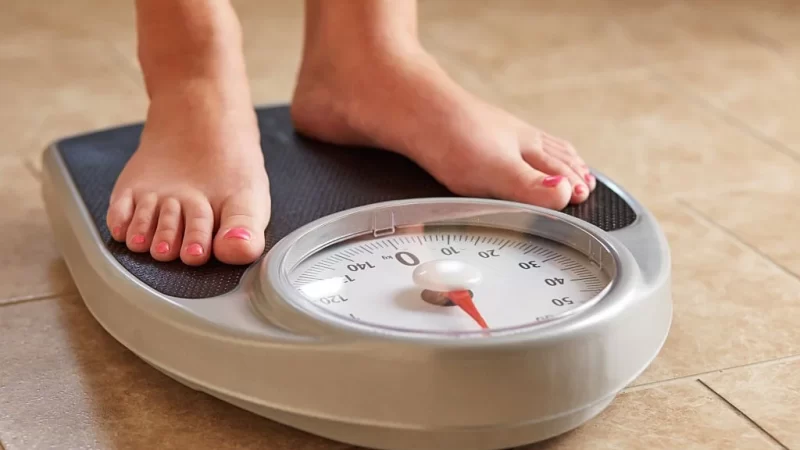How To Gain Weight With A Fast Metabolism? 5 Ways & Tips

How To Gain Weight With A Fast Metabolism? You’ve probably seen people who follow a healthy diet but still struggle with their weight or others who binge on junk food without gaining any weight.
The role of metabolism now comes into play. If you’re curious about how having a fast or slow metabolism may affect your weight, how to gain weight while having a quick metabolism, or both, keep reading.
What Meals Are Best For Weight Gain?
If you want to gain weight, you must adhere to the proper techniques.
- Drinking drinks, eating doughnuts, and eating other junk food may initially help you gain weight, but it may also increase your risk of getting diabetes, cancer, and heart disease.
- Healthy weight growth necessitates a balanced increase in subcutaneous fat and muscle mass rather than a lot of unwelcome belly fat.
- A recent study on animals suggests that having a huge tummy may increase your risk of getting cancer.
- Having a high percentage of body fat increases your risk of type 2 diabetes and other health problems even if you are not overweight.
- To gain weight healthily, concentrate on eating more nutrient-dense meals and living an overall healthy lifestyle that includes working out, getting adequate rest, and reducing stress, if you can.
- In this article, simple methods for quickly gaining weight without increasing your risk of sickness are covered.
Even if you want to put on weight, it’s important to eat mostly healthy foods.
What Makes Weight Growth Important?
There are many overweight people in America.
Some individuals might be genetically predisposed to being underweight or have a fast metabolism.
The presence of an underweight condition may also indicate poor nutrition or underlying medical problems.
Nevertheless, a lot of people who are not clinically underweight may nonetheless wish to gain weight and muscle for a variety of reasons.
Whether you’re aiming to gain muscle weight or are underweight, the foundations are the same.
What Does It Mean To Be “Underweight” Exactly?
The clinical definition of underweight is a body mass index (BMI) of 18.5. This is estimated to be below the body mass needed to sustain optimal health.
However keep in mind that the BMI measure, which only takes weight and height into account, has a number of drawbacks. The amount of muscle mass is not taken into account.
People with different BMIs and body types may nevertheless be in excellent health. This scale says that being underweight is not necessarily a sign of a health problem.
According to the Centers for Disease Control and Prevention (CDC), women are almost twice as likely to be underweight than men. In the U.S.
The survey split participants into men and women, 1.3% of males and 2% of women aged 20 and older are underweight.
A person’s body mass index (BMI), which is measured, is deemed underweight if it is less than 18.5. It affects women more than males.
Recommended: How To Slow Down Metabolism? 5 Natural Ways & 15 Factors
Health Issues Related To Underweight
If you are underweight, it might impair your health.
One study found that those who are clinically underweight had an almost double the risk of dying than people who are fat, suggesting that being underweight may be worse for your health than being obese.
Another study found that after the age of 38, underweight people’s self-reported health outcomes substantially worsened, providing evidence that maintaining a low BMI later in life may be linked to increased health risks.
When you are underweight, you are at risk for infections, osteoporosis, fractures, and infertility. Your immune system is also impacted by it.
Moreover, persons who are underweight are more likely to get dementia and sarcopenia (age-related muscle loss).
Children’s development and growth may also be impacted.
Observation: It’s possible that being underweight is bad for your health. Underweight people are more likely to have osteoporosis, illness, reproductive problems, and early death.
The Underlying In Underweight | 5 Factors
There are many medical conditions that may cause weight loss, including:
- Addictions To Food
This includes the severe mental condition of anorexia nervosa.
- Thyroid Problems
Moreover, of the new ones, of the new ones, of the new ones, of the new ones, of the Trusted Source.
- Celiac Disease
the most severe condition brought on by gluten. The frequency of celiac disease has grown increased throughout the previous two centuries.
- Diabetes
Diabetes that is not under control, particularly type 1, may result in significant weight loss.
- Cancer
Cancer may cause the body to go into a hypercatabolic state, which increases energy use.
How much weight a person loses may depend on the cancer kind and how severe the weight loss is. 24 and 25 are two trustworthy sources.
- Infections
A person may become dangerously underweight as a result of certain illnesses. They could include TB, HIV, and parasites.
If you are underweight, you may want to make an appointment with a doctor to rule out any serious medical issues.
This is really important if you’ve just started losing a lot of weight without trying.
Notably, a variety of diseases may cause weight reduction. If you are underweight, schedule a visit with a physician so they can rule out any serious medical conditions.
There Are Many To Acquire weight | 5 Ways
Whatever your reason for wanting to gain weight, there are various ways you may do so.
You may use the weight-gaining tactics we’ve provided here.
1. Increased Calorie Intake
Consuming a calorie surplus—more calories than your body needs—is the most important thing you can do to acquire weight.
With this calorie calculator, you may estimate your daily caloric requirements.
According to the calculator, you should try to consume 300–500 calories more each day than you expend if you want to gain weight gradually and consistently.
Go for around 700–1,000 more calories per day over your maintenance range if you want to acquire weight quickly.
Remember that calorie estimators are just that—estimates. Give or take a few hundred calories every day, depending on your requirements.
While you don’t have to track calories forever, doing so for the first few days or weeks might help you get a sense of how many calories you’re consuming. There are many excellent tools available to assist you.
You must consume more calories than your body uses in order to acquire weight. For sluggish weight growth, aim for 300–500 more calories per day, or 700–1,000 extra calories for quick weight gain.
2. You Should Consume More Protein
For optimum growth, development, and human health, high-quality proteins from animal products must be consumed in sufficient amounts.
Increasing protein would enhance lean muscle mass, according to a 2020 research including 23 people.
The Recommended Dietary Allowance of protein is between 1 and 1.6 grammes of protein per kilogramme of body weight per day to support skeletal and muscular development and physical strength in healthy people with little to moderate physical activity.
Healthy people may consume up to 2 grammes of protein per kilogramme of body weight per day, with a maximum of 3.5 grammes per kilogramme of body weight per day.
Meats, fish, eggs, certain dairy products, legumes, nuts, and other foods are examples of high-protein foods.
If getting enough protein in your diet is a challenge for you, protein supplements like whey protein might be helpful.
Yet, protein may also dramatically decrease your appetite and hunger, making it more difficult to consume adequate calories.
The risk of developing heart disease may also rise if you consume too much protein.
If you want to gain weight safely, discuss with your doctor if increasing your protein consumption will help.
The building components of your muscles are proteins. Eating adequate protein is required to build muscle in addition to other nutrients.
3. Boost Your Consumption Of Fat And Carbohydrates
While attempting to reduce weight, many individuals limit their intake of carbohydrates or fat.
Since it will be more difficult to consume enough calories, this may make it difficult to gain weight.
If gaining weight is a goal for you, eat plenty of high-carb and high-fat mealsProtein, fat, and carbs have to be present in moderate amounts at each meal.
Avoid eating regimens like intermittent fasting, for example. This diet may be beneficial for losing weight and for other reasons, but it can make it much more difficult to consume enough calories to gain weight.
Eat at least three meals a day, and if you can, include an energy-dense snack.
Eat at least three meals a day and be sure to incorporate plenty of fat, carbohydrates, and protein if you want to gain weight.
4. Increase Your Consumption Of Meals High In Energy
Eating mostly whole foods, such as
- Fruits
- Vegetables
- Whole grains
- And legumes
- Is Crucial.
Yet, since these foods are often more satisfying than processed junk food, it is more difficult to consume enough calories from them.
Use a lot of sauces, condiments, and spices to accomplish this. The simpler it may be to consume a lot of food, the tastier it is. Moreover, toppings could have more calories.
Moreover, make every effort to highlight meals that are high in energy. These are foods with high-calorie counts compared to their weight.
These are some meals that are high in energy and might aid in weight gain:
- Nuts
Walnuts, macadamia nuts, almonds, and peanuts
- Dehydrated Fruit
Dates, raisins, prunes, and other foods
Fatty Dairy Products
Full-fat yoghurt, cheese, and cream; whole milk;
Oils And Fats
Avocado oil, extra virgin olive oil Grains Brown rice with oats
- Meat
Lamb, poultry, hog, beef, and other meats; you may even choose fattier slices
- Tubers
yams, sweet potatoes, and potatoes
Additional Meals High In Energy
Avocados, granola, peanut butter, coconut milk, dark chocolate, and trail mix.
Limiting your diet of fruit and vegetables might be a smart idea if gaining weight is one of your main priorities.
Fruits and vegetables include fibre, which may help you feel fuller more quickly. For meals that are heavy in energy, there can be less room.
Try eating any of these items if you need further advice.
Base as much of your diet as you can on foods that are rich in energy because they are low in artificial colours and flavours and high in calories relative to their weight. These foods are also low in processed sugars.
10 | Additional Tips For Gaining Weight
By ingesting plenty of calories and doing severe resistance training, you may put on weight.
But, there are a variety of ways to gain weight even more rapidly.
Here are some other weight-gain suggestions:
- Avoid Drinking Water Before Meals
You could feel fuller as a result, which would make it harder for you to ingest enough calories.
- Eat More Often
Include a second meal or snack when you can, such as just before bed.
- Consume Milk
A handy way to increase your intake of high-quality protein and calories while simultaneously soothing your thirst is by drinking whole milk.
- Think About Gaining Weight Smoothies
If you are having trouble gaining weight, think about trying weight gainer shakes. They are high in protein, carbs, and calories.
- Use Bigger Plates
Smaller plates tend to encourage people to eat less, therefore if you want to consume more calories, you may want to use bigger plates.
- Drink Your Coffee With Cream
This is a simple way to enhance your calorie intake.
- Think About Creatine
The creatine monohydrate supplement may help you gain a few extra pounds of muscle.
- Have A Good Night’s Sleep
A regular sleep pattern is essential for developing muscles.
- Eat Your Protein And Fat Sources First
Start with foods that are rich in calories and protein if your plate is filled with a variety of foods. Eat fibrous foods last, such as raw vegetables.
- Avoid Smoking
and if you do, consider quitting smoking. Smokers usually weigh less than non-smokers and quitting smoking commonly causes weight gain.
There are plenty of additional things you may do to gain weight more rapidly. These include eating more often, drinking beverages that help you gain weight, drinking milk, and putting cream in your coffee.
How Can I Gain Weight Without Eating Too Much?
To gain weight, you’ll probably need to consume more calories.
You may avoid overeating and make sure that the additional calories are dispersed throughout your muscles and not just your fat cells by starting a resistance training regimen.
Resistance training sometimes referred to as strength training, uses both bodyweight workouts and free weights. Resistance training causes muscle hypertrophy, which increases muscular mass.
When protein supplements are used with resistance training, lean body mass gains that go beyond those achieved with strength exercise alone may be achieved.
If it’s possible for you, consider hiring a qualified personal trainer or enrolling in a class to help you get started if you’re new to exercising.
You may also want to see a doctor if you have any health issues or skeletal problems.
It is advisable to emphasise weight training over cardio in order to improve muscular development.
You may benefit from cardio activity to improve your health and fitness, but you may want to avoid doing so much that you end up burning up all the additional calories you are consuming.
When Will I Begin To Put On Weight?
By consuming 500 more calories each day for six months, a person might gain an extra 15 pounds (6.8 kg) on average.
Over the course of six months, a more severe technique that requires consuming an additional 1,000 calories per day might result in a weight gain of around 25 pounds (11.4 kg). Yet, a significant portion of this weight gain could consist of fat.
The process of gaining weight may be quite difficult for some people, and various people experience weight growth at varying rates.
As your body could have a set point where it feels comfortable, this may be the case. It is believed that whether you try to go below your setpoint (lose weight) or beyond it (gain weight), your body opposes changes by regulating your hunger levels and metabolic rate (increase weight).
Your body could boost metabolism and decrease appetite in order to adjust to increased calorie intake and weight gain. Your brain and hormones like leptin that regulate your weight may have a big impact on this.
Researchers still need to do further research since their hypothesis has not been challenged or proven.
As a consequence, you can run across certain challenges.
Everybody’s body responds to increased calorie intake and weight gain by reducing appetite and boosting metabolism, thus the time it takes to put on weight will differ from person to person.
Conclusion
There are several reasons why someone would want to gain weight.
This must be accomplished by ingesting nutrient-dense meals and putting on lean muscle mass.
You need to run a marathon, not a sprint, to lose weight. It could take a lot of effort and perseverance to succeed over the long haul.
If you’ve tried the aforementioned strategies and are still having trouble gaining weight, it’s imperative to see a doctor or nutritionist. You can visit Globlar.com for News & more updates
With the advice of a dietician, you may utilise dietary strategies that can help you reach your goal.














